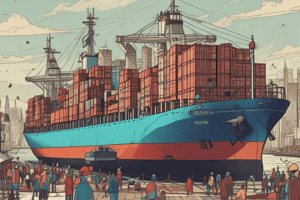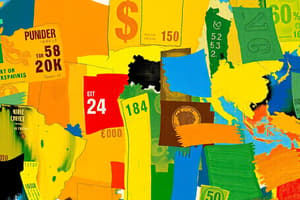Podcast
Questions and Answers
What are some advantages of international trade?
What are some advantages of international trade?
Enhanced production efficiencies, improved consumer choice, increased innovation, scope for job creation, stimulation of competition, fostering peace through interdependence.
What are some challenges or drawbacks associated with international trade?
What are some challenges or drawbacks associated with international trade?
Negative impacts on domestic industries, concentration of wealth, environmental damage due to overproduction, political conflicts over resource distribution.
What does a surplus in the balance of payments account indicate?
What does a surplus in the balance of payments account indicate?
Greater exports compared to imports.
What does a deficit in the balance of payments account imply?
What does a deficit in the balance of payments account imply?
According to empirical evidence, what leads to economic progress?
According to empirical evidence, what leads to economic progress?
Study Notes
International Trade in Economics
When we explore the intricate world of economics, one key element that stands out is international trade. This concept refers to exchanges between countries, where goods, services, capital, and ideas flow across borders. Let's delve into some fundamental aspects of this critical topic.
Basics of International Trade
International trade can take two forms: exporting (selling products from your country to others) and importing (buying items from other nations). Countries engage in both these activities to meet their needs and wants, while also seeking potential economic growth.
Market forces largely drive trade. When a nation produces something more efficiently and cheaply than another one, it has a comparative advantage and will naturally sell those commodities overseas instead of producing them domestically. Likewise, when a product cannot easily be produced locally, imports offer access to global markets.
Protectionism vs Free Trade
Protectionism occurs when governments impose restrictions—such as tariffs and quotas—on foreign goods entering their domestic market. Conversely, free trade allows nations to exchange freely with minimal regulations, aiming to increase efficiency and specialization among trading partners. For instance, free trade agreements like NAFTA or EUROPEAN UNION encourage cross-border trade by lowering barriers and creating common rules within certain regions.
Benefits & Challenges
Advantages of international trade include enhanced production efficiencies, improved consumer choice, increased innovation, scope for job creation, stimulation of competition, and fostering peace through interdependence. However, there may be drawbacks such as negative impacts on domestic industries, concentration of wealth, environmental damage due to overproduction, and political conflicts over resource distribution.
Balance of Payments
To assess a country's overall performance in international transactions, economists look at its balance of payments account. It summarizes all economic flows involving a specific country during a particular period, including current accounts (trade in goods and services), financial accounts (investment and loans), and changes in reserves like gold holdings. A surplus indicates greater exports compared to imports; a deficit implies higher demand for imported goods; whereas a stable situation signifies roughly balanced transactions.
Empirical Evidence
Empiricists have analyzed various data sets to examine whether openness (i.e., extent of international trade relative to GDP) leads to economic progress. Their findings suggest that countries generally achieve better outcomes when they cultivate high levels of interaction with other nations (Hawkins et al., 1999; Heston & Summers, 1999).
In conclusion, understanding international trade offers valuable insights into economic dynamics, helping us comprehend complex real-world problems. By learning how markets adapt to changing circumstances, we gain an appreciation for the opportunities and challenges posed by global interconnectedness.
Studying That Suits You
Use AI to generate personalized quizzes and flashcards to suit your learning preferences.
Description
Explore the world of international trade in economics, from basics and market forces to protectionism vs free trade, benefits, challenges, and the balance of payments. A crucial aspect of economic dynamics, international trade shapes global interactions and economic growth.




